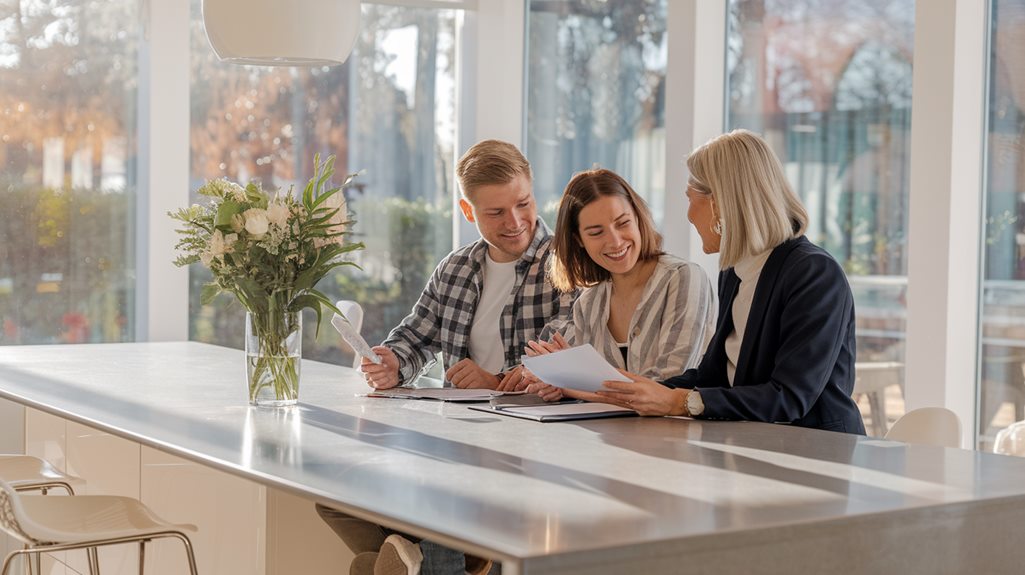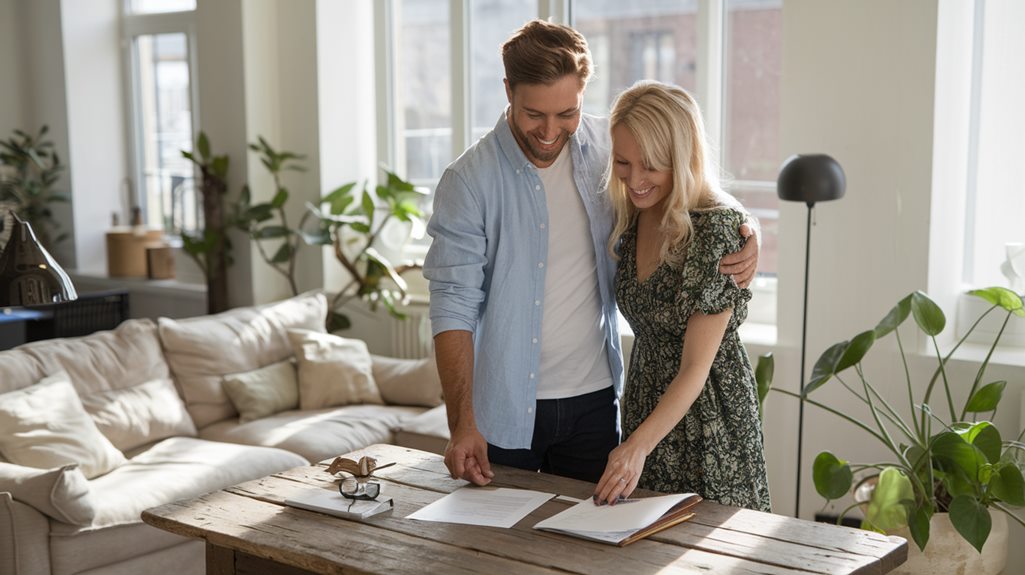Buying your first home can be exciting! Start by looking at your money. Find out how much you can spend and check your credit score to see if it's good enough for a loan. It's a good idea to get pre-approved for a mortgage. This shows you are serious and helps you know your budget.
Next, think about where you want to live. Look at different neighborhoods to find one that fits your style. Going to open houses can help you see what you like or don't like.
When you find a home you want, make an offer. Use information about the market to make sure your offer is strong but also protects your needs.
Finally, when it's time to close the deal, pay close attention to the papers you need to sign. Work with experts to help you through this part.
Each step is important and helps you feel more confident as you buy your home. Keep learning to make the process easier!
Ready to start building equity in your own Michigan home? Get your personalized home loan quote today.
Assess Your Financial Situation

Do you know how much money you have? Before you buy a home, it's really important to check your budget. This means looking at how much money you earn each month and how much you spend.
It helps you see how much you can pay for a house without making life hard for yourself.
Your credit score is also important. It shows how good you're at paying back money. A good credit score can help you get better loan deals and lower interest rates.
If your score is low, try to make it better. By understanding your money situation, you'll feel more confident and happy in your new neighborhood.
Michigan residents, unlock the door to your new home. Request your home loan quote from Treeside Financial today.
Understand Mortgage Options
Getting a good look at your money is super important when it comes to picking a mortgage. It might feel tricky at first, but don't worry! With some helpful information, you can make smart choices.
Here are some things to think about:
- Types of loans: There are different kinds of loans out there. Find one that works best for you and what you can afford.
- Interest rates: Look at fixed rates and adjustable rates. This helps you see which one fits with your plans for the future.
- Down payments and mortgage insurance: Know how these things affect how much you'll pay each month and in total.
- Comparing lenders: Check out different lenders to make sure you get the best deal.
With these points in mind, you'll be ready to choose the right mortgage for you!
Get Pre-Approved for a Loan

Getting pre-approved for a loan is like opening the door to your new home. It shows you what you can afford and helps you look good to sellers. When you get pre-approved, you show that you're ready to buy and are serious about it. This can help you stand out from other buyers.
First, check your credit score. This score affects what kind of loans you can get and how much interest you'll pay. A good credit score can help you get better loan options.
You might be closer to buying your home than you think
Take our 2-minute home buyer readiness quiz to see how prepared you really are – no credit check required.

Talk to different lenders to find out about the types of loans they offer. It's important to find a loan that fits your money situation.
Getting pre-approved helps you know your budget and gives you confidence. It shows sellers that you're ready to buy a home and be part of their neighborhood.
Research Neighborhoods
When buying your first home, picking the right neighborhood is super important. It can really change how you live and how happy you feel. Here are some things to think about:
- Fun places nearby: Check if there are parks, shops, or places to play that you like.
- Schools: Good schools matter even if you don't have kids. They can help your home's value go up.
- Safety: You want to feel safe where you live. A good neighborhood keeps you and your home secure.
- Getting around: If there's good public transport, it can make your daily trips easier.
Also, look at who lives in the neighborhood. You want to feel like you fit in.
Check for new buildings or fun places that might come to the area. These can change how nice a place is to live and how much your home is worth.
Doing this research will help you find a neighborhood where you feel at home.
Attend Open Houses

Once you've found a neighborhood that feels just right for you, it's time to go see some open houses. This is your chance to walk through homes and imagine what life would be like there.
First, remember to be polite. Arrive on time, be respectful, and say hello to the person showing the house. You're not just looking at the house; you're also showing that you're a nice person.
These days, you can also take virtual tours. They're super helpful! You can look at homes online before you visit them. This way, you can pick your favorites more easily.
Make a Competitive Offer
To make a good offer, you first need to know what's happening in the market.
Look at homes that have sold recently to see how much they went for. This will help you decide a fair price that you can afford.
It's important to include key conditions to keep yourself safe while also letting the sellers know you're really interested in buying.
Understand Market Trends
Buying your first home can feel scary, but knowing what's happening in the real estate market can help you make a smart offer.
Here are some easy things to watch:
- Recent sales: Look at how much similar homes sold for in the area you like.
- Market conditions: Is it a good time for buyers or sellers? This will help you know if you should offer more or less.
- Buyer demand: If a lot of people want homes, you need to act fast!
- Economic indicators: Things like interest rates and jobs can change how much homes cost.
Determine Offer Limits
Before you decide how much to offer on a house, it's very important to know your limits. This way, you can make a good bid without spending too much money. You want to find a home that you love without hurting your wallet. Start by looking at your money situation and set a clear top amount for your offer. This helps you stick to your budget while thinking about what is important to you.
| Factor | Importance Level | Things to Think About |
|---|---|---|
| Market Value | High | Prices of similar homes |
| Personal Priorities | Medium | Where it is, what it has |
| Budget Constraints | Critical | Loan approval, savings amount |
Think about these things when making your offer. This way, you can stay within your limits and make an offer that sellers will like. By doing this, you will find a home that really fits what you need and want.
Prioritize Essential Contingencies
Making a strong offer on a home is important, especially for first-time buyers. You need to think about the right things to include in your offer to keep yourself safe while also making it attractive to the seller.
Here are some key points to consider:
- Home Inspection: This helps you check if the house is safe and in good shape.
- Appraisal: This makes sure that the house is worth the price you're offering.
- Financing: This is about getting your loan without any surprises.
- Title Check: This confirms that the seller really owns the house and there are no legal problems.
It's important to find a balance between what you want and what the seller expects.
Being flexible can help you. For example, you might be able to change the time you need for certain steps or be open to talking about repairs.
Navigate the Closing Process

To make the closing process easy, you need to know some important papers, get the right money ready, and work with the right people.
First, look at the purchase agreement, loan papers, and title information to make sure everything looks good.
Next, talk with your real estate agent, lender, and lawyer to fix any problems and make sure the closing goes well.
Understand Key Documents
Getting ready to buy your new home can feel exciting and a little scary. But don't worry! You can feel more confident by learning about the important papers you need to look at when closing your home.
Knowing these papers will help you move into your new home smoothly and feel good about being part of the neighborhood. Here are some key papers to know:
- Title documents: These show who owns the house and if there are any problems with it, like debts.
- Disclosure statements: These tell you important things about how the house is, like if there are any issues.
- Title insurance: This helps protect you if someone claims they own your house.
- Purchase agreement: This paper tells you all the details about buying the house.
Also, look at inspection reports to see if the house is in good shape and appraisal results that help with your loan estimate.
Lastly, check the closing disclosure to make sure all the money details are what you expected. Learning about these papers will help you make smart choices.
Prepare Necessary Funds
Getting ready to buy your first home is exciting! But before you celebrate, make sure you have enough money saved up.
First, think about how much money you need for the down payment and closing costs. It's important to know exactly what you need.
Next, keep track of your spending. Make a budget to help you save money. This way, you won't be surprised by any extra costs.
It might help to have a separate bank account just for your home funds. This will keep you from spending that money by mistake.
When you stay organized and stick to your savings plan, you'll be ready to join other happy homeowners.
Coordinate With Professionals
Buying your first home is very exciting! But it's really important to work with the right people to help you. These experts will make sure everything goes smoothly.
- Real estate agents: They help you talk about prices and fill out papers.
- Home inspectors: They check if the house is in good shape.
- Mortgage brokers: They find the best loans for you.
- Title companies: They make sure the house really belongs to the seller.
You should also talk to insurance agents to get the right coverage and closing attorneys to help with the legal stuff.
Appraisers check how much the house is worth, and financial advisors help you make sure buying a home is a good choice for your money.
When you work with these friendly experts, you'll feel good and ready to be a homeowner!








